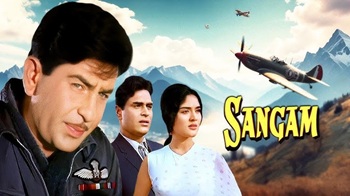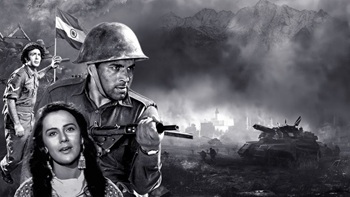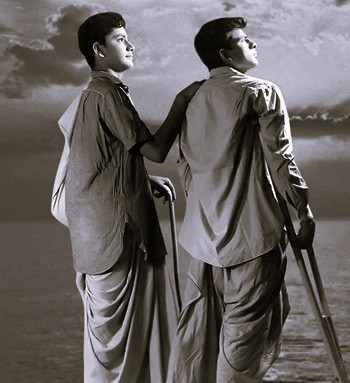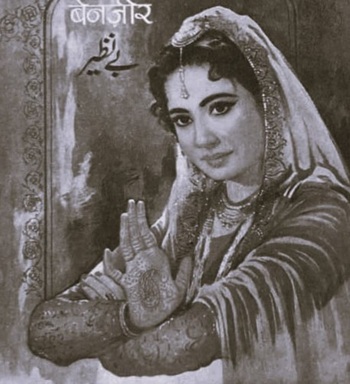Feb 24, 2026
Feb 24, 2026
The 1960s – Golden Years – Part 8
Sangam was Raj Kapoor’s colour magnum opus, starring Raj Kapoor, Vyjayantimala, and Rajendra Kumar in a love triangle of three friends growing up together. Two of them, Radha (Vyjayantimala) and Gopal (Rajendra Kumar), who are rich, grow up loving each other but restrain themselves, but the other boy, Sunder (Raj Kapoor), oblivious of their feelings, openly declares his love for the girl.  Their bond of friendship is so strong that the other two humour him to avoid hurting him. Their mutual feelings are eloquently expressed in the song Har Dil Jo Pyar Karega Woh Gana Gayega. Radha cannot express her true feelings, and Sunder joins the Indian Air Force, believing she loves him. When he is declared missing on an important mission, the family assumes that he is dead. Radha and Gopal openly exchange their feelings and prepare to get married. At this stage, Sunder returns as a national hero and confides in Gopal about his love for Radha. Ever constant in his friendship, Gopal sacrifices his love for Radha and persuades her to marry Sunder. Radha vows to be a good wife, and the couple leaves for their European honeymoon. After they return, Sunder finds an unsigned love letter addressed to Radha. Overcome by jealousy, Sunder threatens Radha to reveal the author’s name. Their life is disrupted until, during a confrontation involving all three, Gopal shoots himself.
Their bond of friendship is so strong that the other two humour him to avoid hurting him. Their mutual feelings are eloquently expressed in the song Har Dil Jo Pyar Karega Woh Gana Gayega. Radha cannot express her true feelings, and Sunder joins the Indian Air Force, believing she loves him. When he is declared missing on an important mission, the family assumes that he is dead. Radha and Gopal openly exchange their feelings and prepare to get married. At this stage, Sunder returns as a national hero and confides in Gopal about his love for Radha. Ever constant in his friendship, Gopal sacrifices his love for Radha and persuades her to marry Sunder. Radha vows to be a good wife, and the couple leaves for their European honeymoon. After they return, Sunder finds an unsigned love letter addressed to Radha. Overcome by jealousy, Sunder threatens Radha to reveal the author’s name. Their life is disrupted until, during a confrontation involving all three, Gopal shoots himself.
Sangam was the first Indian colour film to be exclusively shot abroad in European locations. It was among the most expensive films of its time, with a runtime of four hours with two intervals. It was a major commercial success, ranking as the highest-grossing Hindi film of the year, and the second highest-grossing film of the decade behind Mughal-E-Azam (1960).
Soon after the success of Mehboob Khan's Andaz (1948), Raj Kapoor had planned to launch a film with Dilip Kumar, Nargis, and himself based on a story by Inder Raj Anand, but the project remained in limbo till 1962. Dilip Kumar wanted to have a say in the editing of the film, but Raj Kapoor could not accept the condition. With Dev Anand and Uttam Kumar declining his offer, Raj Kumar zeroed in on Rajendra Kumar. Raj Kapoor’s showmanship was fully in evidence in his choice of locations, screenplay, cinematography, direction, and filming of songs. Raj Kapoor, Vyjayantimala, and Rajendra Kumar gave sterling performances. All the songs were megahits. My favourite songs are Har dil jo pyar karega sung by Mukesh, Lata Mangeshkar, and Mahendra Kapoor, Mohammed Rafi’s Yeh mera prem patra padhkar and Mukesh’s Dost dost na raha.
In the 12th Filmfare Awards in 1965, Raj Kapoor won the Awards for Best Direction and Editing for Sangam, and Vyjayantimala for Best Actress. The film was also nominated for Best Movie.
 Haqeeqat, written, directed, and produced by Chetan Anand, is based on the events of the 1962 Sino-Indian War. For our generation, this war was a traumatic experience and an eye-opener for the nation on the state of preparedness of the country’s defence forces to face external aggression.
Haqeeqat, written, directed, and produced by Chetan Anand, is based on the events of the 1962 Sino-Indian War. For our generation, this war was a traumatic experience and an eye-opener for the nation on the state of preparedness of the country’s defence forces to face external aggression.
I was posted as Assistant Operating Superintendent in the Sealdah Division of Eastern Railway. On 20 October 1962, the Chinese People’s Liberation Army launched simultaneous attacks in Ladakh in the West and Arunachal Pradesh in the Northeast, and speedily pushed the Indian Army back, threatening Tezpur, forcing the local government to order the evacuation of civilians. The news caused panic in Calcutta with fears of an impending invasion. The government called up all reserves and ordered the mobilization of the Territorial Army (TA). Divisional Superintendent, Sealdah, and my immediate boss, the Divisional Operating Superintendent, were among the TA Officers called up to the front. We all bade them a sombre farewell, with the families in tears. China declared a unilateral ceasefire on 20 November 1962 and simultaneously announced its withdrawal to the Line of Actual Control (LAC). Indian forces suffered heavy casualties. On the Western Front, dead bodies of Indian troops were found in the ice, frozen, with weapons in hand.
The setback left the country stunned. People asked the government uncomfortable questions. Prime Minister Jawaharlal Nehru attributed it to China’s calumny and perfidy. His surprise and chagrin at this betrayal of trust led to a dramatic decline in his health. Kavi Pradeep composed a tribute to the martyrs of the war. The song, Ae mere watan ke logon, tuned by C Ramchandra, was sung with feeling by Lata Mangeshkar in the presence of the Prime Minister, moving him to tears.
Haqeeqat recalls the battle of Rezang La, the only part of the war in which Indian troops came out on top. Out of the 120 Indian soldiers who fought in Rezang La, 114 were killed, but they are said to have killed 1300 Chinese soldiers. The film was mostly shot on location in Ladakh, the first Bollywood film to be shot there. The film stars Dharmendra, Balraj Sahni, Sanjay Khan, and Vijay Anand in major roles. Priya Rajvansh made her debut in the film. Madan Mohan composed the music of the film, and the lyrics were written by Kaifi Azmi. Chetan Anand, Balraj Sahni, lyricist Kaifi Azmi, and actress Shaukat Azmi, belonging to the Indian People's Theatre Association (IPTA), worked on the film free of charge. The film focuses on the impact war has on the common soldier. The songs in the film effectively capture this sentiment. Lively romantic tunes, Mohammed Rafi’s Masti Mein Chhedke Tarana Koi Dil ka, and Lata Mangeshkar’s Zara Si Aahat Hoti Hai To Dil Sochta Hai and Khelo Naa Mere Dil Se O Mere Saajana Lata are followed by the sad tune, Main Ye Sochkar Uske Dar Se Utha Tha, rendered by Mohammed Rafi with deep feeling.
Ab Tumhare Hawaale Watan Saathiyon, sung by Mohammed Rafi is one of the most heard patriotic songs in India. Over five minutes long, the song is accompanied by visuals of dead Indian soldiers all over the landscape. The lyrics of Ho Ke Majboor Mujhe Usne Bhulaya Hoga capture the emotions of stranded soldiers who have lost hope.
Haqeeqat won the National Film Award for Second Best Feature Film in 1965. It is considered one of the best black and white films made in India.
 Dosti produced by Tarachand Barjatya and directed by Satyen Bose, focuses on the friendship between a blind boy and a physically disabled boy. Newcomers, Sudhir Kumar Sawant and Sushil Kumar Somaya, played the lead roles, supported by Abhi Bhattacharya, Sanjay Khan, Farida Dadi, Nana Palsikar, and Leela Mishra in supporting roles. It was the second film produced for Rajshri Productions,
Dosti produced by Tarachand Barjatya and directed by Satyen Bose, focuses on the friendship between a blind boy and a physically disabled boy. Newcomers, Sudhir Kumar Sawant and Sushil Kumar Somaya, played the lead roles, supported by Abhi Bhattacharya, Sanjay Khan, Farida Dadi, Nana Palsikar, and Leela Mishra in supporting roles. It was the second film produced for Rajshri Productions,
Dosti was the remake of the Bengali film Lalu Bhulu (1959). Released in the year of Sangam, Aayee Milan ki Bela, Kashmir ki kali, Zindagi, Woh Kaun Thi, and Leader, Dosti lacked star power and the usual masala plot. There was no villain, no heroine, no glamour, and no romance. Music directors Lakshmikant Pyarelal had debuted only a year earlier. Despite these handicaps, Dosti became the third highest-grossing film of the year. The credit goes in a large measure to director Satyen Bose, and the meaningful songs written by Majrooh Sultanpuri and tuned by Lakshmikant Pyarelal.
The film is the story of Ramu (Sushil Kumar), who loses his mobility in an accident, his mother to illness, and his education to poverty. Alone on the streets, he meets Mohan (Sudhir Kumar), who is blind and separated from his sister. Together, they sing songs that tug at the heartstrings of people, with Ramu playing his harmonica. RD Burman played the harmonica for Ramu. Beyond the kinship between these plucky physically challenged teenagers and their struggles, Dosti holds up a mirror to the state of things in India a decade and a half after the country gained Independence, as hopes in the new economic order fade in the face of poverty, unemployment, and degrading morals.
Lakshmikant Pyarelal scored heavily with the success of their music in the film. Mohammed Rafi’s Chaahunga main tujhe sanjh savere, Jaanewalon zara mudke dekho mujhe, Raahi manwa dukh ki chinta and Koi jab raah na paaye and Lata Mangeshkar’s Gudiya humse roothi rahogi kab tak are evergreen hits.
In the 12th Filmfare Awards in 1965, Dosti won six of the seven Awards for which it was nominated, including Best Film, Best Music, Best Singer and Best Lyricist. In the National Film Awards, it was adjudged the Best Feature Film in Hindi.
 Benazir, produced by Bimal Roy, starring Ashok Kumar, Meena Kumari, Shashi Kapoor, Tarun Bose, and Tanuja, was written and directed by S Khalil. Gulzar was credited as Chief Assistant Director. Music Director SD Burman provided the music, and Shakeel Badayuni wrote the lyrics. Bimal Roy had cast Shashi Kapoor in Prempatra, but the film did not fare too well at the box office. Feeling guilty, Bimal Roy assured him that he was part of Bimal Roy Productions and promised to work with him again soon. He kept his promise by casting Shashi Kapoor in Benazir but could not direct the film himself because of his deteriorating health.
Benazir, produced by Bimal Roy, starring Ashok Kumar, Meena Kumari, Shashi Kapoor, Tarun Bose, and Tanuja, was written and directed by S Khalil. Gulzar was credited as Chief Assistant Director. Music Director SD Burman provided the music, and Shakeel Badayuni wrote the lyrics. Bimal Roy had cast Shashi Kapoor in Prempatra, but the film did not fare too well at the box office. Feeling guilty, Bimal Roy assured him that he was part of Bimal Roy Productions and promised to work with him again soon. He kept his promise by casting Shashi Kapoor in Benazir but could not direct the film himself because of his deteriorating health.
Benazir was the tragic story of a dancer played by Meena Kumari. Benazir is an orphan, found after the Bihar earthquake by a person who lost his daughter in the natural disaster. She grows up to be a dancer in Lucknow, where Afsar Nawab (Ashok Kumar) becomes her admirer and benefactor, preferring her to his wife (Nirupa Roy). She is extremely grateful but doesn’t respond to his love. Instead, she dreams of another lover, who materialises in the form of Anwar (Shashi Kapoor), younger brother of the Nawab. Unaware of her interest, Anwar falls in love with his Bhabhi’s younger sister Shahida (Tanuja), and with the elders in favour, all is set for their wedding. But Shaukat (Tarun Bose), a poor relative living with the family, has his eye on Shahida. He hatches a plot to show the Nawab that Anwar is involved with Benazir. Enraged, the Nawab banishes his brother and falls critically ill with the shock. His wife breaks social norms to fetch Benazir to nurse him back to health. When he recovers, Benazir tells the Nawab the truth about Anwar and his wife’s role in his recovery. The Nawab and his wife realize that Shaukat is the culprit, but Shaukat manages to get Shahida’s parents to agree to give her in marriage to him. With the Nawab and his wife reconciled, Benazir decides to leave Lucknow. Meanwhile, Anwar has become a door-to-door salesman in Bombay and suddenly encounters Benazir during his rounds. He flees from her and is hit by a vehicle while running across a road. Benazir takes charge of him and nurses him back to health, spending all her money on his treatment. When he learns about her dedication and the role she played in his brother’s illness, Anwar has a change of heart and decides to stay with Benazir for life. The Nawab, who has been searching for Anwar, finds his whereabouts and comes to take him home, but bows to his decision to stay back. While parting with Benazir, the Nawab mentions his concern for Shahida, who is deeply in love with Anwar. Benazir makes the supreme sacrifice to bring Anwar and Shahida together.
The film had all the elements of a good Bimal Roy movie: a good story and screenplay, true-to-life characters, good acting, and good songs. Meena Kumari and Ashok Kumar are at their best. Shashi Kapoor is very believable, and so are Nirupa Roy, Tarun Bose, and Tanuja. Two sequences give the impression that Bimal Roy guided his two assistants and credited the direction to the one who had been with him longer. In the first, Anwar is questioning Benazir about her life with his brother, but she is so lost in him that she doesn’t hear his question. In the other, Benazir’s mental struggle after hearing about Shahida’s love for Anwar is beautifully expressed through a play of light and shade. Meena Kumari excels in both scenes.
SD Burman’s music is appropriate. Shakeel Badayuni’s lyrics are meaningful. The songs Baharon ki mehfil suhani rahegi and Husn ki baharen liye aaye they sanam sung by Lata Mangeshkar, Dil mein ek jane tamanna ne sung by Mohammed Rafi, Mubarak hai woh dil jisko kisi se sung by Lata Mangeshkar, Asha Bhonsle and Usha Mangeshkar and Gham nahin gar zindagi veeran hai sung by Asha Bhonsle are all worth listening to.
26-Apr-2025
More by : Ramarao Annavarapu

|
Excellent as always, sir. The movie Dosti was great.. It tugs at my heartstrings even today... |